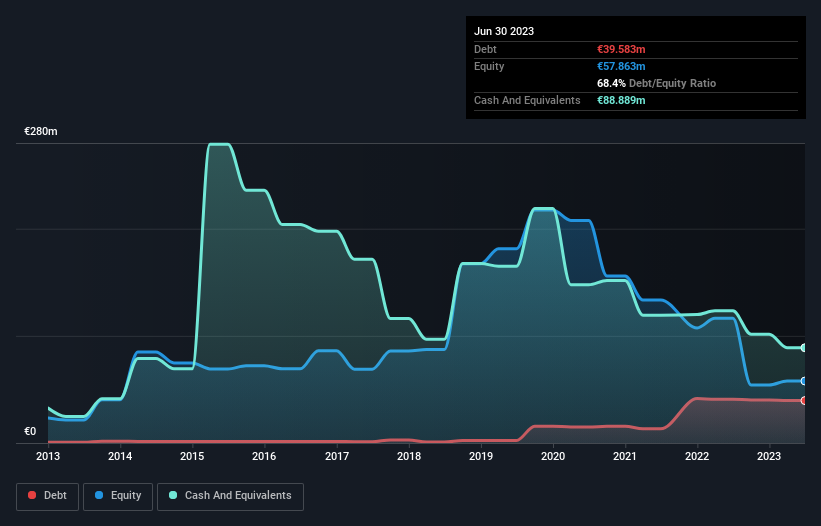Some say volatility, rather than debt, is the best way to think about risk as an investor, but Warren Buffett famously said that 'Volatility is far from synonymous with risk.' It's only natural to consider a company's balance sheet when you examine how risky it is, since debt is often involved when a business collapses. Importantly, Innate Pharma S.A. (EPA:IPH) does carry debt. But should shareholders be worried about its use of debt?
Why Does Debt Bring Risk?
Debt and other liabilities become risky for a business when it cannot easily fulfill those obligations, either with free cash flow or by raising capital at an attractive price. Part and parcel of capitalism is the process of 'creative destruction' where failed businesses are mercilessly liquidated by their bankers. However, a more usual (but still expensive) situation is where a company must dilute shareholders at a cheap share price simply to get debt under control. Of course, debt can be an important tool in businesses, particularly capital heavy businesses. The first step when considering a company's debt levels is to consider its cash and debt together.
See our latest analysis for Innate Pharma
How Much Debt Does Innate Pharma Carry?
As you can see below, Innate Pharma had €39.6m of debt, at June 2023, which is about the same as the year before. You can click the chart for greater detail. However, it does have €88.9m in cash offsetting this, leading to net cash of €49.3m.

How Healthy Is Innate Pharma's Balance Sheet?
According to the last reported balance sheet, Innate Pharma had liabilities of €37.7m due within 12 months, and liabilities of €103.5m due beyond 12 months. Offsetting this, it had €88.9m in cash and €49.1m in receivables that were due within 12 months. So it has liabilities totalling €3.21m more than its cash and near-term receivables, combined.
This state of affairs indicates that Innate Pharma's balance sheet looks quite solid, as its total liabilities are just about equal to its liquid assets. So it's very unlikely that the €213.7m company is short on cash, but still worth keeping an eye on the balance sheet. While it does have liabilities worth noting, Innate Pharma also has more cash than debt, so we're pretty confident it can manage its debt safely. When analysing debt levels, the balance sheet is the obvious place to start. But ultimately the future profitability of the business will decide if Innate Pharma can strengthen its balance sheet over time. So if you're focused on the future you can check out this free report showing analyst profit forecasts.
Over 12 months, Innate Pharma made a loss at the EBIT level, and saw its revenue drop to €52m, which is a fall of 8.2%. That's not what we would hope to see.
So How Risky Is Innate Pharma?
Statistically speaking companies that lose money are riskier than those that make money. And in the last year Innate Pharma had an earnings before interest and tax (EBIT) loss, truth be told. And over the same period it saw negative free cash outflow of €33m and booked a €63m accounting loss. But the saving grace is the €49.3m on the balance sheet. That means it could keep spending at its current rate for more than two years. Summing up, we're a little skeptical of this one, as it seems fairly risky in the absence of free cashflow. When analysing debt levels, the balance sheet is the obvious place to start. However, not all investment risk resides within the balance sheet - far from it. Case in point: We've spotted 2 warning signs for Innate Pharma you should be aware of.
At the end of the day, it's often better to focus on companies that are free from net debt. You can access our special list of such companies (all with a track record of profit growth). It's free.
New: AI Stock Screener & Alerts
Our new AI Stock Screener scans the market every day to uncover opportunities.
• Dividend Powerhouses (3%+ Yield)
• Undervalued Small Caps with Insider Buying
• High growth Tech and AI Companies
Or build your own from over 50 metrics.
Have feedback on this article? Concerned about the content? Get in touch with us directly. Alternatively, email editorial-team (at) simplywallst.com.
This article by Simply Wall St is general in nature. We provide commentary based on historical data and analyst forecasts only using an unbiased methodology and our articles are not intended to be financial advice. It does not constitute a recommendation to buy or sell any stock, and does not take account of your objectives, or your financial situation. We aim to bring you long-term focused analysis driven by fundamental data. Note that our analysis may not factor in the latest price-sensitive company announcements or qualitative material. Simply Wall St has no position in any stocks mentioned.
About ENXTPA:IPH
Innate Pharma
Operates as a biotechnology company that develops immunotherapies for cancer patients in France and internationally.
Adequate balance sheet with limited growth.
Similar Companies
Market Insights
Community Narratives



